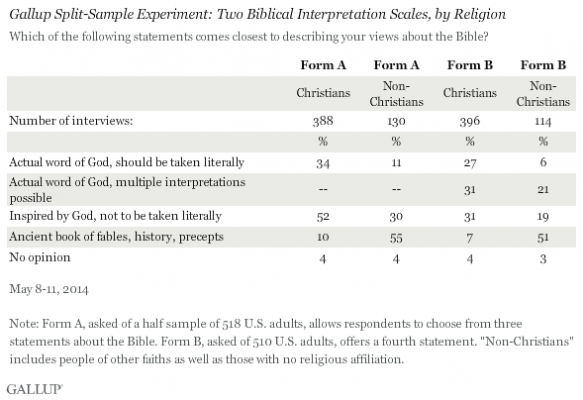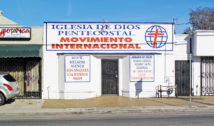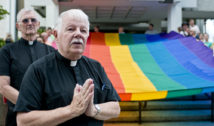
Non-Christians Believe in the Bible? What?
- By Krista R. Burdine --
- 23 Jul 2014 --

The results of the 2014 Gallup Values and Beliefs poll have been released, and the non-Christians answers to at least one question has raised a few eyebrows.
Each year the Gallup poll asks, “Which of the following statements comes closest to describing your views about the Bible?” As usual, about 75% of respondents believe it is the word of God, while 21% think it is a collection of fables. But an additional answer option this year for half the surveyed group strengthened and changed the composition of the group that believes the Bible is the word of God.
The Multiple Interpretations Shift
In Form A of the survey, answer options included the following, with percentages noted:
- 28% The Bible is the actual Word of God and is to be taken literally, word for word.
- 47% The Bible is the inspired Word of God but not everything in it should be taken literally.
- 21% The Bible is an ancient book of fables, legends, history and moral precepts recorded by man.
Form B of the survey kept these options and added a fourth, with this result:
- 22% The Bible is the actual Word of God and is to be taken literally, word for word.
- 28% The Bible is the actual Word of God but multiple interpretations are possible.
- 28% The Bible is the inspired Word of God but not everything in it should be taken literally.
- 18% The Bible is an ancient book of fables, legends, history and moral precepts recorded by man.
While the survey has a margin of error of 5%, that does present a significant swing of opinion toward the new “multiple interpretations” option. For some reason, that answer resonated with 31% of respondents, nearly a third. The explanation for this is still unclear, but it does seem to confirm the sense that American culture has become more openly pluralistic.
John MacArthur, megachurch pastor and bestselling author, finds this statistic of 28% believing in Multiple Interpretations revealing of a shift in Christian culture, and feels that it generates circular logic. He claims there is little threat to believing in the Bible as God’s Word as long as one can reserve the right of refusal and claim a misinterpretation when that Word challenges our desires.

While this is one possibility, another perspective could find it encouraging that, when given this option in Form B, a greater percentage of respondents were able to attribute the Bible to God as opposed to a completely man-made collection of fables. It could be that some Christians understand that the Bible is composed of various types of literature; parts of God’s Word are to be taken literally but others, such as proverbs and parables, are stories meant to make a spiritual point. Or it could simply be that the same percentage of respondents felt the same way on Form A, but did not have a choice that best described their opinion. So the survey may represent less of a shift and more of an improved accuracy of the poll.
The Bible-Believing Non-Christians
Another interesting finding of this dual-form question is that of who exactly made the shift to the Multiple Interpretations option. Among Christians, the biggest shift was among those who believe the Bible is the Word of God but not to be taken literally, from 52% to 31%, which accounts for about ⅔ of those who chose the Multiple Interpretations option. Surprisingly, professing non-Christians also shifted their answer between the same two options by about the same percentage, 30% to 19%. The total number of self-identified non-Christians who believe the Bible is a book of fables dropped from 55% to 51%, bringing to about 46% the number who believe that in some form or another, the Bible is the Word of God.
It seems that non-Christians prefer to think of the Bible as a divine book that is open to interpretation, than to say it’s a true book with some non-literal content. But most startling of all, about 6% of non-Christians do believe in the Bible as the literal Word of God. When examining the demographics of non-Christian literalists further, this group generally has no religious upbringing or affiliation, yet they believe in the existence of God. They tend to be nonwhite, second generation Americans with less education than average, and politically liberal. If anything, this sounds like a group disillusioned with what they have seen of religion in America, who have not found themselves compelled by what they have seen to seek out the God who literally wrote the book.
Maybe next time, someone can explain how 10% of people who identify as Christian also see the Bible as a collection of fairy tales, or manage to have no opinion on the matter.



















1 comment
Krista R. Burdine
1:10 pm“If anything, this sounds like a group disillusioned with what they have seen of religion in America, who have not found themselves compelled by what they have seen to seek out the God who literally wrote the book.” –from above Gallup poll
As Christians, we are to be “The light of the world.” Matthew 5:14
Therefore, “Let your light shine before men in such a way that they may see your good works, and glorify your Father who is in heaven.” Matthew 5:16